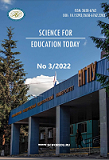Сравнительный анализ эффективности обучения по естественнонаучным дисциплинам при дистанционном и традиционном формате
The effectiveness of distance and traditional teaching natural sciences: A comparative analysis
Author(s): Elena Anatolyevna Chanchaeva, Tatiana Kalauidenovna Kurilenko, Vitali Olegovich Nedelski, Ekaterina Vasilievna Kruglikova, Andrej Mechislavovich GrjibovskiSubject(s): School education, Sociology of Education, Distance learning / e-learning, Pedagogy
Published by: Новосибирский государственный педагогический университет
Keywords: Distance learning; Traditional learning; Natural science; Laboratory work; Practical skills; Knowledge assessment; Education of culture of behavior;
Summary/Abstract: Introduction. The article focuses on the problem of the effectiveness of distance learning. The most recent pandemic has led to the widespread use of distance learning as an alternative to the traditional classroom instruction. However, there is no consensus on whether distance education is superior to the traditional teaching in terms of learning outcomes and perception. The purpose of this study is to compare the effectiveness of teaching natural sciences in distance and traditional modes. Materials and Methods. The data were collected via the following general research methods: synthesis and generalization of scholarly literature on the problem, empirical methods including surveys and interviews, and comparative analysis of research findings. A comparative analysis of the effectiveness of distance learning and traditional classroom instruction was conducted relying on the results of teaching natural science disciplines at Gorno-Altaisk State University in the period of 2020- 2022, synthesis and analysis of international and Russian studies on the problem. Results. The authors identified the disadvantages and advantages of distance learning with the main focus on natural science disciplines. It has been found that laboratory assignments performed in a distance mode changed the student’s role from being a researcher to the role of an observer. Moreover, there was a decrease in the development of practical skills. Within the framework of traditional learning, the teacher acts as a mentor responsible for enhancing students’ knowledge, for nurturing the culture of behavior while the teacher’s role in distance education is that of a mediator facilitating students’ independent learning. It should also be noted that within distance learning environment teachers cannot perform a range of professional functions beyond educational. As far as final assessment is concerned, it must be emphasized that it can be extremely difficult to conduct objective assessment of students’ knowledge and competencies in a distance learning environment. On the other hand, the advantages of assessment via electronic and online media include flexibility and convenience. Conclusions. The authors conclude that nowadays the effectiveness of teaching natural sciences in the distance learning environment is lower than in the traditional one. In order to increase its efficiency, it is necessary to improve digital technologies and develop new teaching methods suitable for the distance learning environment. The limitations of distance learning include decrease in students’ learning outcomes, objectivity of final assessment, and partial implementation of moral education activities.
Journal: Science for Education Today
- Issue Year: 12/2022
- Issue No: 3
- Page Range: 149-168
- Page Count: 20
- Language: Russian

